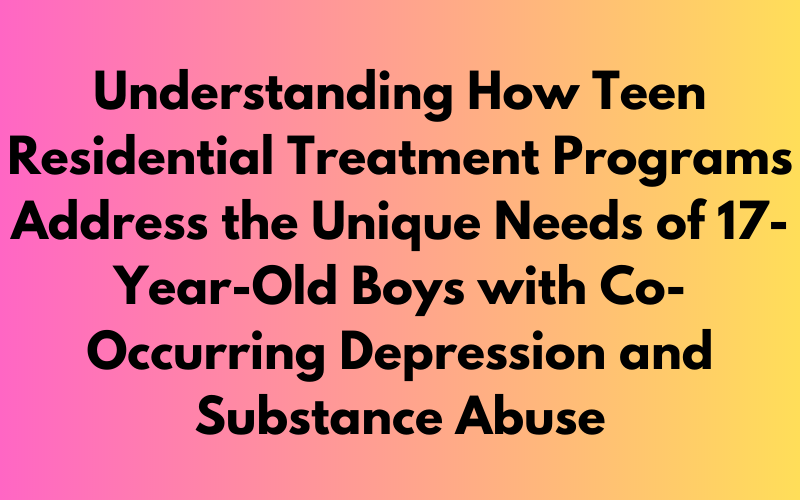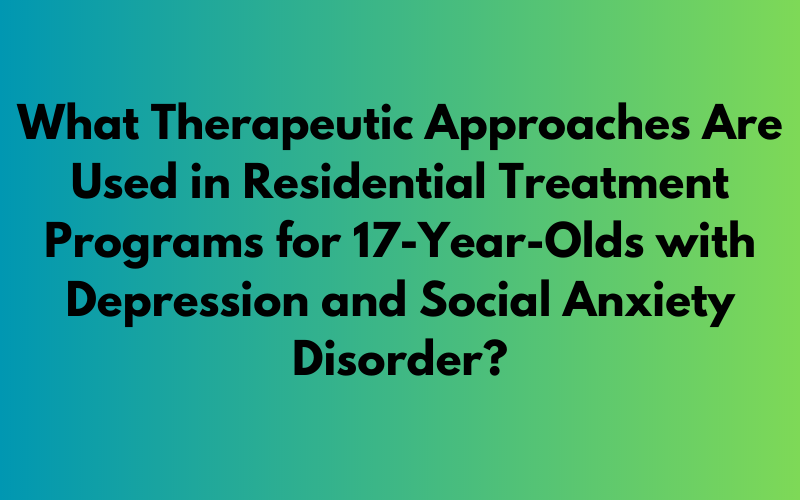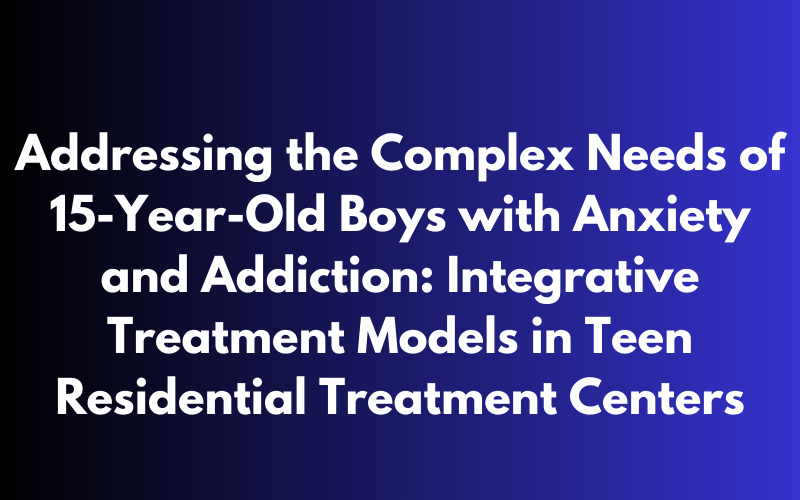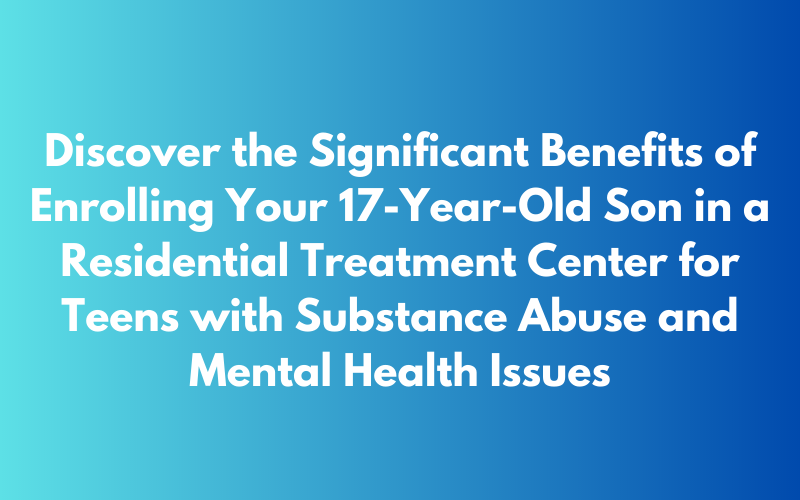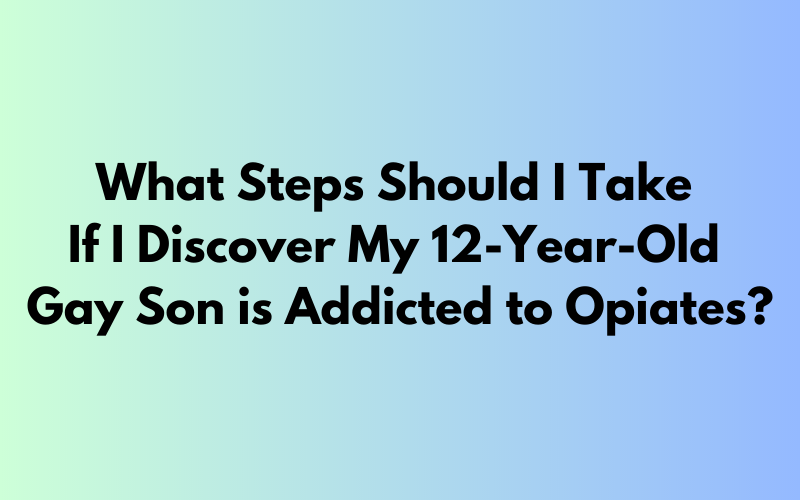Specialized Residential Treatment in Malibu for 17-Year-Old Facing Mental and Substance Abuse Issues
Now, you have a specialised Residential treatment center in Malibu, CA, for your 17-year-old son facing mental health and substance abuse.
Teens facing mental and substance abuse issues are said to have”co-occurring disorders” or “dual diagnosis.” If not handled appropriately, things can go wrong in the treatment process. For instance, an incomplete or inaccurate diagnosis could address only one aspect of the problem. Non-compliance due to substance abuse, medication interactions, and emotional instability can further complicate treatment, making therapies less effective or even hazardous. Moreover, not all treatment facilities are equipped to manage dual-diagnosis cases, and a lack of specialised care could lead to suboptimal outcomes.
Luckily, Malibu has some reputed residential treatment centres for teens, including Key Healthcare, Safe Haven, and Faith Recovery, providing Dual diagnosis programs. Enrolling your teen on a specialised residential treatment center in Malibu ensures that both teen mental health and substance abuse issues are addressed cohesively and comprehensively.
What Are Adolescent Dual Diagnosis Issues
The term teen “dual diagnosis” refers to the co-occurrence of a mental health disorder and a substance use disorder in the same adolescents. This situation complicates the treatment process, as both conditions are often interrelated and may exacerbate each other. Here are some common dual diagnosis issues:
Mental Health Disorders Often Involved:
- Depression
- Anxiety disorders (Generalized Anxiety Disorder, Panic Disorder, Social Anxiety, etc.)
- Bipolar Disorder
- Schizophrenia
- Personality Disorders (Borderline, Antisocial, etc.)
- Post-Traumatic Stress Disorder (PTSD)
Substance Use Disorders Often Involved:
- Alcohol abuse
- Opioid abuse
- Cannabis abuse
- Cocaine or stimulant abuse
- Benzodiazepine abuse
- Hallucinogen abuse
Benefits of Enrolling Your Teens with Co-Occurring Disorders In Specialized Residential Treatment
Dual-diagnosis treatment programs, such as those potentially found in Malibu’s residential treatment center, offer invaluable integrated care for young teen boys and girls struggling with mental health disorders and substance abuse.
Comprehensive Treatment
The dual-diagnosis approach allows for a comprehensive treatment plan that addresses both mental health issues such as depression, anxiety, or bipolar disorder alongside addiction to substances like alcohol, opioids, or stimulants. This holistic view ensures that one issue isn’t masked or intensified by the other, thereby increasing the chances of a full recovery.
Customized Therapy
Given the complexity of dual diagnosis, specialized treatment centers offer customized therapy options that are designed to treat both conditions. Your teen will get help to achieve sobriety and learn coping mechanisms for mental health issues, thereby improving their overall quality of life.
Better Long-term Outcomes
Treating both issues simultaneously makes for a more efficient treatment process and contributes to more sustainable long-term outcomes. Dual-diagnosis treatment often results in fewer relapses and greater psychological well-being.
By acknowledging the intricacies of mental health and substance abuse, dual-diagnosis treatment is uniquely suited to tackle the challenges your 17-year-old might face.
Why Send Your Troubled Teen To Residential Treatment Center in Malibu
Choosing the right location for a residential treatment center is more than just a physical facility. The surrounding environment can play a significant role in healing, and Malibu offers unique advantages.
Natural Beauty
Malibu’s lush landscapes, calming beaches, and serene mountain views can significantly improve your teen’s well-being. Research has shown that natural settings can reduce stress hormones, lower anxiety, improve mood and boost concentration. In a place like Malibu, your teen can connect with nature, contributing to their mental and emotional recovery.
A Retreat from Everyday Triggers
Being distant from the usual environment can help teens focus solely on their recovery. Malibu offers a secluded, peaceful setting away from the daily triggers that may contribute to substance abuse or exacerbate mental health issues.
High-Quality Facilities
Malibu is home to some of the most renowned residential treatment centers in the country, known for their top-notch facilities and state-of-the-art treatments. These centers are specifically equipped to handle dual-diagnosis cases, offering a wide range of therapies and medical treatments to aid in your teen’s recovery.
Professional Expertise
Given Malibu’s reputation as a hub for high-quality treatment centers, it attracts some of the best addiction and mental health medical professionals. The benefit is that your child will receive care from highly specialized experts experienced in treating young people.
In summary, Malibu’s natural, tranquil environment, its high-quality treatment facilities, and professional expertise provide a healing space that is second to none. This optimal setting can significantly benefit your 17-year-old’s journey toward lasting recovery.
Specialized Programs for Teens’ Mental Health And Substance Abuse
It’s essential to understand that adolescence can be a tricky period. Thankfully, there are specialized programs to help teens navigate these challenges, especially when it comes to mental health and substance abuse. Let’s dive into what these programs offer:
1. Cognitive Behavioral Therapy (CBT)- Change your thoughts and you change your world.” – Norman Vincent Peale
What it is: Teen CBT therapy focus on identifying and changing negative thought patterns and behaviors.
Why it’s special: It equips teens with practical skills to manage stress, anxiety, and other challenges.
2. Acceptance and Commitment Therapy (ACT)- Acceptance doesn’t mean resignation; it means understanding that something is what it is and that there’s got to be a way through it.” – Michael J. Fox
What it is: Teen ACT therapy helps teens accept their feelings and commit to actions aligning with their values.
Why it’s special: It emphasizes mindfulness and value-driven actions.
3. Dialectical Behavior Therapy (DBT)- Balance is not something you find; it’s something you create.” – Jana Kingsford
What it is: A DBT therapy for teens blending cognitive-behavioral techniques with mindfulness strategies.
Why it’s special: It’s particularly effective for emotional regulation and improving interpersonal relationships.
4. Yoga Therapy- Yoga is the journey of the self, through the self, to the self.” – The Bhagavad Gita
What it is: Incorporating yoga postures and breathing exercises into therapeutic practices.
Why it’s special: It harmonizes the mind, body, and spirit, enhancing overall well-being.
5. Art and Music Therapy- Art and music are the windows to the soul.” – Unknown
What they are: Therapies using artistic expression, be it through drawing, painting, or making music.
Why they’re special: They offer teens a creative outlet to express and process emotions.
6. Surf Therapy- The best wave of your life is still out there.” – Unknown
What it is: Using the act of surfing as a therapeutic tool.
Why it’s special: It blends physical activity with the calming nature of the ocean, teaching resilience and confidence.
7. Individual Therapy- Sometimes, simply by sitting, the soul collects wisdom.” – Zen Proverb
What it is: One-on-one sessions between a therapist and the teen.
Why it’s special: It offers a private space for deep reflection and understanding.
8. Group Therapy- Together we can do so much.” – Helen Keller
What it is: Therapy sessions involving multiple participants.
Why it’s special: It fosters a sense of community, showing teens they’re not alone in their struggles.
Benefits Of Enrolling 17 Year Old Son In A Residential Treatment Center
One of the most significant advantages of enrolling your teen in a specialized residential treatment center in Malibu is the high professional expertise available. Here’s how your 17-year-old stands to benefit from this:
Expert-Led Therapy
Your child will have access to highly skilled therapists specializing in adolescent mental health and addiction issues. These professionals are adept at forming therapeutic relationships with teens, helping them open up and engage more meaningfully in recovery.
Multidisciplinary Teams
Malibu centers often employ a multidisciplinary approach to treatment. This means that your teen will be cared for by a team of experts, including psychiatrists, psychologists, counselors, nurses, and other healthcare providers, collaborating to develop the most effective treatment plan.
Evidence-Based Treatments
Because these professionals are at the forefront of their fields, the treatments offered are evidence-based and follow the latest guidelines and best practices in mental health and substance abuse treatment.
Cutting-Edge Medical Treatments
Should medication be necessary for your teen’s treatment, rest assured that Malibu’s specialized centers have medical professionals skilled in adolescent pharmacotherapy. These experts can fine-tune medication regimens to be most effective while minimizing potential side effects.
Ongoing Training
The field of mental health and addiction therapy is ever-evolving. Professionals at Malibu centers often undergo ongoing training and certifications to stay updated on the latest treatment methodologies, ensuring your teen receives the best care possible.
With access to skilled professionals who are experts in teen mental health and substance abuse, you can be confident that your child is in capable hands, greatly increasing the likelihood of a successful recovery.
Family-Focused Recovery
As parents, you are crucial to your teen’s recovery journey. Specialised residential treatment centres in Malibu recognize this importance and integrate family involvement into their comprehensive treatment strategy. Here are some ways this family-focused approach can benefit your teen:
Family Therapy
Family therapy sessions aim to improve communication between family members, resolve conflicts, and discuss how mental health and substance abuse have impacted the family dynamics. These sessions provide a safe space for everyone to express their concerns and collaborate on solutions.
Parental Support Groups
Knowing that you’re not alone can be incredibly reassuring. Many Malibu centers offer parental support groups where you can meet other families going through similar challenges. Sharing experiences and coping strategies can be highly beneficial.
Educational Programs
Understanding the complexities of mental health and addiction can equip you better to support your teen. Treatment centers often offer educational programs to update parents on the latest treatment options, warning signs of relapse, and how to provide a supportive home environment.
Family Visits
Though the primary focus is on the teen’s recovery, family visits are usually encouraged and incorporated into the treatment plan. These visits boost your teen’s morale and provide additional support that is vital for long-term recovery.
Aftercare Planning
As your teen nears the end of their residential treatment, the focus will shift toward reintegration into daily life. Families are closely involved in this stage, helping to develop an aftercare plan that may include ongoing therapy, medication management, and contingency plans for challenging situations.
The family-centric model facilitates a more nuanced and effective treatment for your teen and prepares you as a parent to actively participate in your child’s recovery journey, both during treatment and beyond.
Conclusion
As a parent, grappling with your 17-year-old’s mental health and substance abuse issues can be an emotionally taxing, uncertain experience. However, specialized residential treatment centers in Malibu offer a multi-faceted approach to address these complex challenges. From the dual-diagnosis treatment focus and specialized teen programs to the involvement of skilled professionals and a strong family component, these centers provide an environment where your teen can achieve lasting recovery.
Remember, choosing a residential treatment center is a significant commitment, but it’s one that could reshape your teen’s future, setting them on the path to a fulfilling, healthy life. Malibu’s serene environment and high-quality facilities provide a unique opportunity for both treatment and healing, making it an ideal choice for families facing the complexities of adolescent mental health and substance abuse.
Frequently Asked Questions
Q. 1. What are some common mental health disorders involved in teen dual diagnosis?
Ans: Common mental health disorders include Depression, Anxiety disorders (like Generalized Anxiety Disorder, Panic Disorder, Social Anxiety, etc.), Bipolar Disorder, Schizophrenia, Personality Disorders (like Borderline, Antisocial, etc.), and Post-Traumatic Stress Disorder (PTSD).
Q. 2. Which substance use disorders are often seen in dual-diagnosis teens?
Ans: These include Alcohol abuse, Opioid abuse, Cannabis abuse, Cocaine or stimulant abuse, Benzodiazepine abuse, and Hallucinogen abuse.
Q. 3. Why should one consider specialized residential treatment in Malibu for their teen?
Ans: Malibu offers reputed residential treatment centers known for their dual diagnosis programs. By enrolling your teen in a specialized center in Malibu, both their mental health and substance abuse issues can be addressed cohesively and comprehensively.
Q. 4. What benefits does Malibu’s environment offer for the healing process?
Ans: Malibu’s lush landscapes, calming beaches, and serene mountain views can significantly improve a teen’s well-being. The natural setting can reduce stress hormones, lower anxiety, and improve mood. Moreover, Malibu offers a secluded environment, away from daily triggers, supporting focused recovery.
Q. 5. How are Malibu’s treatment programs tailored for teens?
Ans: Malibu’s residential treatment centers offer specialized programs designed for the unique needs of 17-year-olds. These programs focus on age-appropriate therapies, peer support, educational continuity, family involvement, and essential life skill development.
Q. 6. What holistic treatment approaches are available in Malibu centers?
Ans: Centers in Malibu often provide holistic treatments like yoga, meditation, nature therapy, nutritional guidance, creative therapies (arts and music), and spiritual guidance. These treatments help reinforce traditional therapeutic methods, promoting a comprehensive recovery.
Q. 7. How do specialized centers in Malibu ensure the effectiveness of treatments?
Ans: These centers provide access to highly skilled professionals specializing in adolescent mental health and substance abuse. They employ a multidisciplinary approach, offer evidence-based treatments, and continuously update their methodologies.
Q. 8. What role does the family play in the recovery process in Malibu centers?
Ans: Family involvement is integral to the treatment strategy in Malibu. This includes family therapy sessions, parental support groups, educational programs for parents, family visits, and aftercare planning to ensure a smooth transition post-treatment.
Q. 9. How do Malibu centers help maintain educational continuity for teens?
Ans: Many centers in Malibu offer educational support alongside treatment. This ensures that teens don’t fall behind academically while they focus on their recovery.
Q. 10. Are the treatments in Malibu centers evidence-based?
Ans: Yes, professionals in Malibu centers offer treatments based on the latest guidelines and best practices in the fields of mental health and substance abuse.
Q. 11. How do holistic treatments benefit teens in recovery?
Ans: Holistic treatments focus on the mind-body connection, helping teens manage stress, control impulses, and achieve emotional balance. They offer multiple pathways to healing, allowing for a comprehensive recovery process.
Q. 12. What kind of professionals can one expect in Malibu’s specialized centers?
Ans: Malibu centers often have a team of psychiatrists, psychologists, counselors, nurses, and other healthcare providers experienced in treating young people. They collaborate to develop the most effective treatment plan for each individual.
Q. 13. What is the significance of family therapy in the treatment process?
Ans: Family therapy aims to improve communication among family members, resolve conflicts, and address the impact of mental health and substance abuse on family dynamics. It provides a space for open dialogue and solution-focused discussions.
Q. 14. Why is Malibu considered an optimal choice for treating teen dual-diagnosis?
Ans: Malibu combines a serene, natural environment with high-quality treatment facilities, making it an ideal choice for families addressing adolescent mental health and substance abuse complexities. The unique combination of environment, expertise, and specialized programs ensures comprehensive care for teens.
